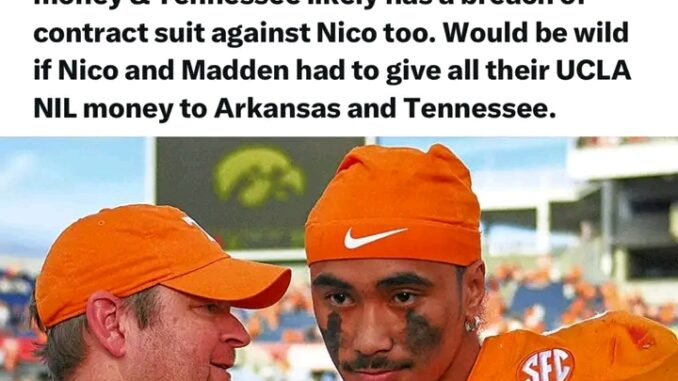
There’s been growing tension surrounding the college football world as reports surface that Arkansas is preparing to pursue legal action against quarterback Madden Iamaleava, citing a breach of contract related to his Name, Image, and Likeness (NIL) deal. Iamaleava, who was previously associated with Arkansas in a recruitment or NIL agreement context, appears to have violated terms that the program considered binding, potentially leading to litigation over the financial aspects of his commitment or departure. This move by Arkansas reflects a broader shift in how seriously schools are beginning to treat NIL arrangements, treating them with the same legal weight as professional contracts.
Meanwhile, Tennessee may find itself in a similar position regarding another high-profile quarterback—Nico Iamaleava, who is widely believed to be Madden’s brother. Tennessee had high hopes for Nico, and it seems they too could be considering legal action for a possible breach of contract tied to NIL agreements. If both cases proceed, it could mark a turning point in the college football landscape, where the previously informal nature of player-school commitments under NIL could become far more legally rigorous.
The situation grows even more complicated with both Madden and Nico now reportedly affiliated with UCLA, raising the possibility that any financial gains they’ve received through NIL deals there could be at stake. If Arkansas and Tennessee were to win their respective breach of contract suits, it could force the Iamaleava brothers to forfeit substantial NIL earnings made while at UCLA. That scenario—where UCLA’s NIL funds might ultimately end up in the hands of other schools due to legal judgments—would be unprecedented in college sports.
This entire situation underscores the legal and financial complexities that have emerged in the wake of NIL legislation. What was once a relatively straightforward process of athletic recruitment has evolved into a tangled web of contracts, endorsements, and now, potential litigation. It’s a vivid example of how NIL deals, which were introduced to empower student-athletes and provide them with more control over their financial futures, are now creating high-stakes disputes reminiscent of professional sports legal battles.
Should the legal actions proceed, the college football world will be watching closely. The outcomes could set new legal precedents regarding how NIL agreements are enforced and how much control schools have over the actions of athletes who have already signed such deals. It might also influence how future NIL contracts are written—likely with stricter language and more defined obligations for both athletes and schools.
In short, if Arkansas and Tennessee successfully challenge the Iamaleavas over their commitments and NIL earnings, it could cause a seismic shift in how college athletics manage the intersection of talent, contracts, and endorsement money. And it would be quite the spectacle if both quarterbacks, now at UCLA, were ultimately ordered to redirect their NIL windfalls back to the programs they left behind.
Leave a Reply